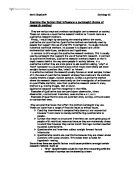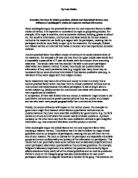Identify & Discuss The Factors Which Will Influence A Researchers Choice Of Methods
Identify & Discuss The Factors Which Will Influence A Researchers Choice Of Methods
When researchers decide to carry out investigations and studies, they must first decide how they are going obtain the accurate data, which they need to support their initial hypothesis and aim. Once the researcher has selected the topic, which they want to investigate, they need to choose the correct methods to collect their data. The choice of the methods they use depends on a number of factors. For example, there are practical considerations, in some cases participant observation or researcher participation may be a better way of investigating behaviour in gangs, than asking the members to fill out questionnaires and participate in interviews. On the other hand, interviews, questionnaires may be better used in other research topic circumstances, in which they provide important statistical data, from which general conclusions can be generalised from.
Halfpenny (1984), suggests that there are, ‘Two main research traditions or approaches to research with sociology”. Firstly, there are Positivist researchers. These researchers, when deciding methods to use in their research use hard quantitative data, such as questionnaires and surveys, mainly using first hand primary data. They gather numerical data, for example questionnaires, which have several advantages. For example, questionnaires can save time, they can be given out to a large sample and results can be straight away collected. Then from this, you can translate the answers given into numerical form, often resulting in statistics, which can be used officially. They do this for many reasons. Positivists state that by just observing an event, you cannot gather hard meanings, therefore they aim to measure behaviour by translating it into numbers, scientific, empirical data, believing that, ‘logic of inquiry is the same across all sciences (social and natural)’. Through the use of scientific data, it allows us to gather accurate results. Hard evidence, empirical data is the best generator or results rather than arguments, which can be generalised too much and not show the true conclusions. Also, they have the main goal of developing a, ‘ultimate goal is to develop the ’ Julian (2002), meaning that if they create a perfect model of any circumstance, then by manipulating the variables in this condition, you can generalise any situation from the results of that one event. They do this mainly by laboratory experiments, as it allows them to control any outside factors, which they do not want. It is controlled and safe. The main reason for using scientific methods is that it provides secure evidence, Gregon (1994), claims that, ‘the ultimate goal of science is to produce knowledge, regardless of politics, morals, values, etc. involved in the research. Science should be judged by logic’. In summarising Positivists, it can be seen that they try and use scientific, primary research methods to gain evidence, which allows hard, safe results, which can give out the correct results. Postal questionnaires and structured interviews are examples of primary methods, which fit in with the positivist approach to research.







